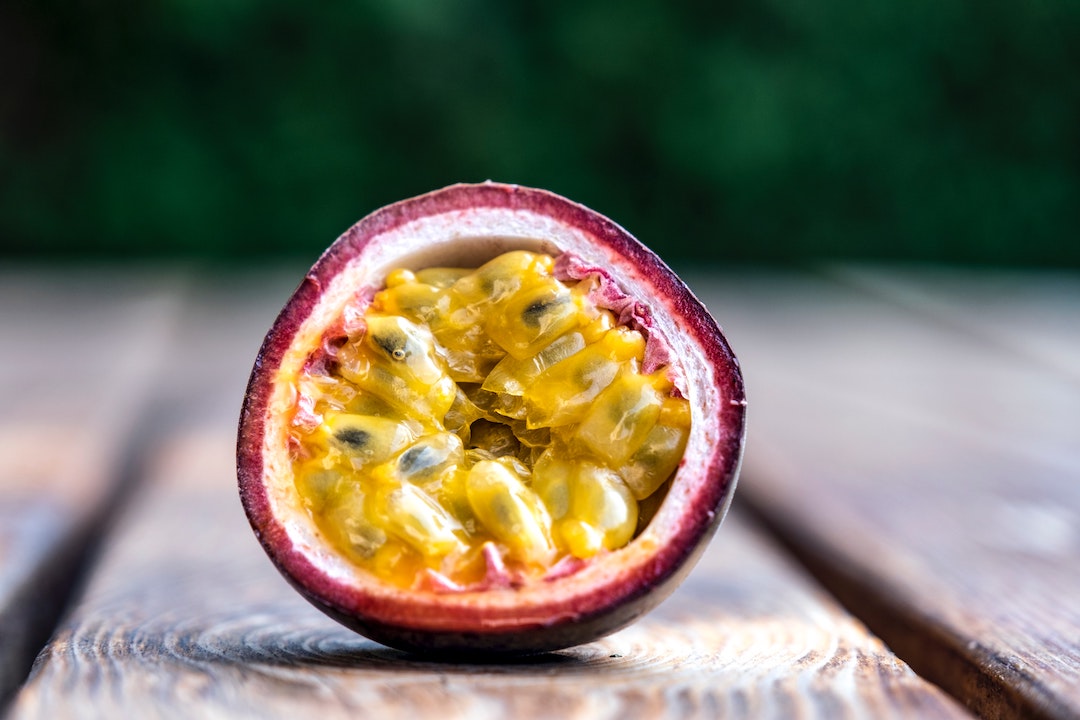Can dogs eat passion fruit?
With a sexy name like passion fruit, it’s no wonder this fruit is insanely popular – and delicious! The sweet and tart, seedy fruit is actually a berry, and it can be eaten raw, or more commonly as a natural flavoring in cocktails, desserts, ice cream, and juice.
Passion fruit is primarily found in tropical regions, but luckily, it’s been making its way to other parts of the world, so everyone can enjoy its citrusy flavor.
But can your dog eat passion fruit too? The answer is not so simple. Read on to learn all about dogs and passion fruit.
What is passion fruit?
If you’re from a tropical country, then you’re most likely very familiar with this delicious fruit already. Otherwise, you might have never, or rarely, seen it in grocery stores!
Passion fruit, also known as Passiflora edulis, is a passion flower species that most likely originated in the southern areas of Brazil and into Argentina and Paraguay. Today, it grows in other warm climate areas including Australia, South Africa, New Zealand, Hawaii, Israel, and India.
The actual fruit has a round to oval shape, and ranges in diameter from 1.5 inches to about 3 inches in size. It can come in yellow, probably the most common color, as well as other varieties, like red, purple, and green. Passion fruit has many seeds and a juicy, yet firm interior, with a soft yellowish pulp full of tiny black seeds. It’s not totally liquid, but not totally solid either!
There are typically a whopping 250 black seeds within each fruit, and each seed is surrounded by a membranous sac filled with pulpy juice. It’s unique, that’s for sure, and sweet, tart, and refreshing.
While it’s known by the exotic name passion fruit in the United States, it’s called other things in different parts of the world, including maracuyá in Spanish, lilikoi in Hawaiian, maracujá in Portuguese, and grenadille in French.
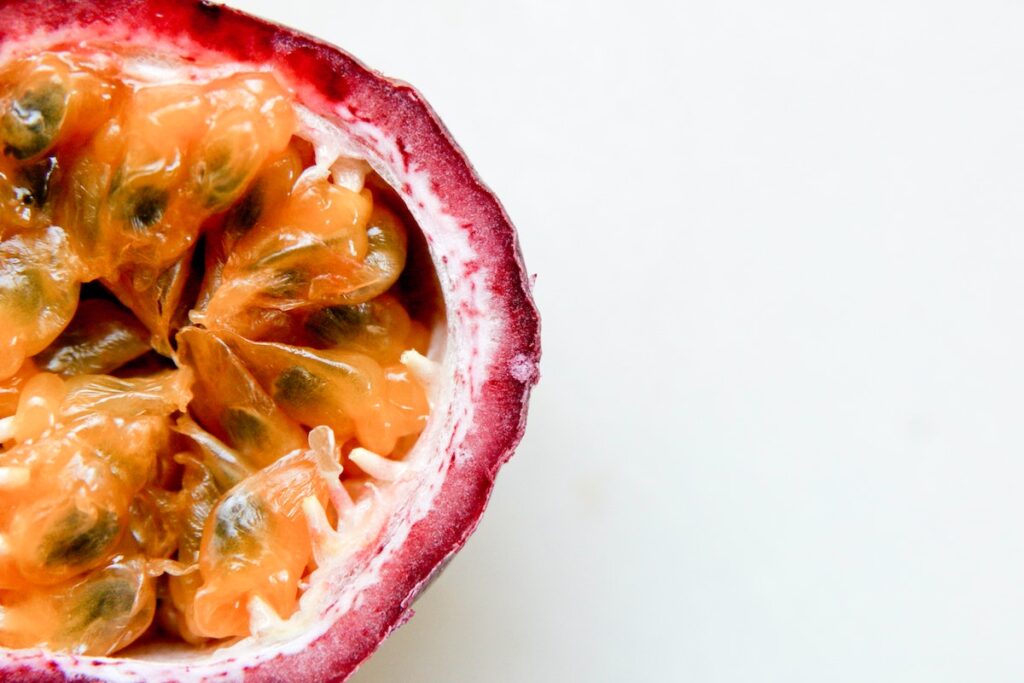
Can dogs have passion fruit?
If you’re wondering if your dog can have passion fruit, the answer is a little complicated. The short answer is no, and the long answer is, well you’ll have to keep reading to find out.
The flesh of a passion fruit isn’t toxic to dogs, but other parts of the fruit, like the seeds, are! Passion fruit seeds, similar to cherry pits and apple seeds, contain cyanide.
It’s possible to give your dog a taste of the fruit’s flesh without the seeds, but if you’ve ever seen the inside of a passion fruit, then you’ll know that separating the seeds from the rest of the fruit would be a pretty difficult and tedious task.
For that reason, it’s best to go with no, your dog shouldn’t eat passion fruit.
For those up to the task of separating flesh and seed, it’s ok to give your dog a small amount of the passion fruit flesh, as long as the fruit is ripe, there is no outer skin or seeds present, and it’s given in moderation. Passion fruit can lead to diarrhea if eaten in excess, given the high levels of sugar and fiber.
But, in general, it’s not worth the risk or the hassle to feed passion fruit to your dog. Stick to other, safer fruits, like bananas and blueberries.
Is passion fruit bad for dogs?
It can be! There are instances where passion fruit can be harmful to your dog. These include the following situations:
Unripe Passion Fruit: If the passion fruit is unripe, meaning it hasn’t matured, it can be toxic to both you and your dog. The concentration of cyanide in passion fruit is highest when the fruit is unripe. It’s found in the passion fruit seeds and rind. Stay away!
Allergies: Passion fruit can trigger allergies in humans and/or dogs with latex allergies.
Seeds and Skin: Always avoid the seeds and skin of the passion fruit, which contain cyanide. Cyanide is toxic, and if your dog eats an excess amount, they may suffer from symptoms like diarrhea, vomiting, difficulty breathing, or other health issues which can be fatal.
The risks are higher than the benefits when it comes to feeding your dog passion fruit, so stay away from it altogether.
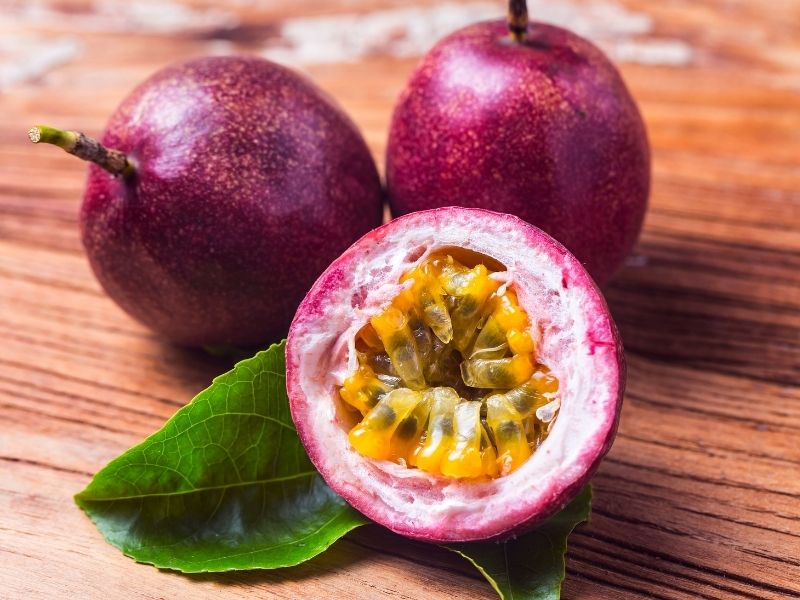
Can dogs eat purple passion fruit?
The most common type of passion fruit is yellow-orange in color, but a purple variety also exists! Purple passion fruit is smaller than yellow passion fruit, less acidic, richer in flavor and aroma, and juicier.
Just like with yellow passion fruit, the skin and seeds of the purple fashion fruit contain cyanide. When consumed in large quantities, it can be potentially poisonous and cause some serious health issues.
As delicious as they are, treat purple passion fruit just as you would yellow passion fruit and keep them away from your dog. The same goes for other passion fruit varieties, like red and green.
Health benefits of passion fruit for dogs:
Passion fruit has a lot of health benefits, but the truth is, your dog should only ever be fed a small amount – and a very specific part of the fruit – if any at all. This amount is unfortunately too small for them to really benefit from any of the nutritional goodies passion fruit has to offer.
But for those who might be curious, passion fruit is a significant source of Vitamins A and C, potassium, iron, fiber, and minerals.
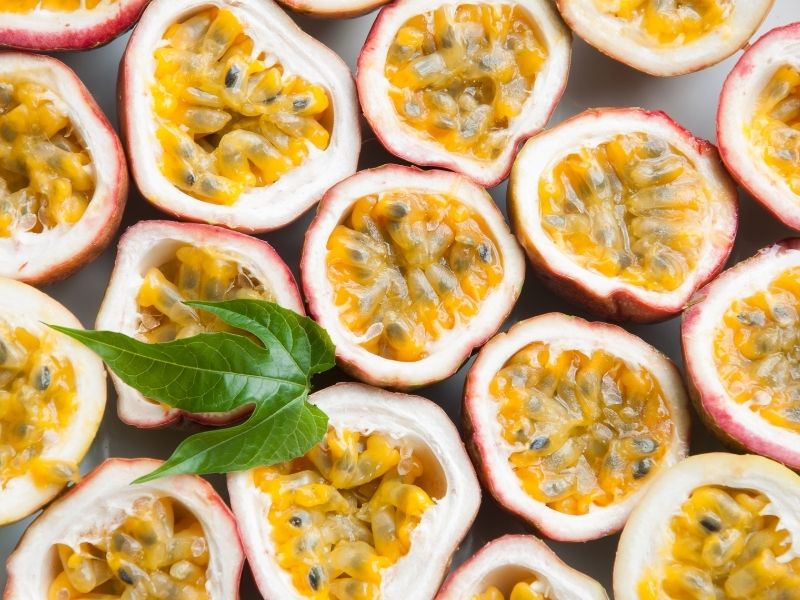
How much passion fruit can my dog eat?
If for some reason you do decide to give your dog a taste of passion fruit, it would have to be just the fruit’s flesh and only a very small amount. The fruit should be ripe and contain zero seeds or skin.
But, as stated above, it’s really not worth the risk. Your dog will be perfectly happy skipping the passion fruit and eating other, more dog-friendly fruits, like bananas or apples.
Can dogs eat passion fruit seeds?
No, dogs should not eat passion fruit seeds.
The seeds contain cyanide, which is a toxin. If eaten in excess, they can poison your dog and cause potentially serious health issues. Your dog may experience anything from diarrhea to vomiting, or in more serious cases, fatal complications.
Keep passion fruit seeds away from your dog.
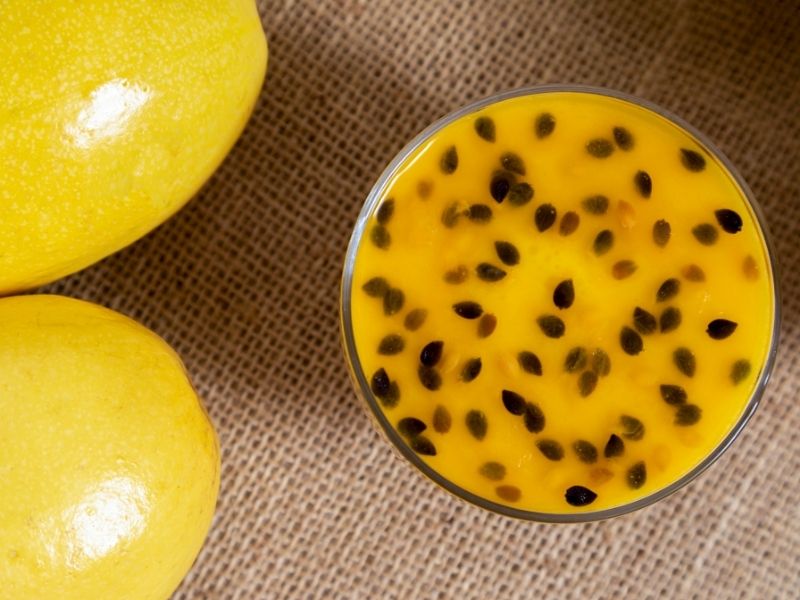
Can dogs eat passion fruit skin?
No, dogs should not eat the skin of a passion fruit.
Passion fruit peel comes in a variety of colors: purple, green, yellow, and orange. None of it is safe for dogs to consume. Like the seeds, passion fruit peel contains cyanide, which is toxic to dogs.
If eaten in large quantities, it can be extremely dangerous for your dog. Luckily, the skin is a bit tough and not appealing to most dogs. Either way, keep it far out of reach.
Can dogs eat passion fruit sorbet?
As passion fruit climbs the ranks of popular fruits each year, we’ve seen it shared in different mouth-watering ways. One such popular way is in sorbet! Passion fruit sorbet is delicious, refreshing, and dairy-free. But should you let your dog have a lick?
Probably not. Even if the sorbet does not appear to contain the passion fruit seeds or skin, they might have been blended into the juice and used for flavoring. Sorbet is also packed full of sugar, something that has no nutritional benefit for your dog. And depending on where it was made, it might also have artificial sweeteners and flavors that can be harmful.
Enjoy the sorbet yourself and give your dog something else.
Can dogs eat passion fruit ice cream?
Passion fruit ice cream is elegant, cold, and super tasty, but is it safe for your dog to eat? Probably not.
Just like with sorbet, store-bought passion fruit ice cream is jam packed with sugar and chemical additives, making it unhealthy for your dog.
Homemade passion fruit ice cream isn’t a great option either, even if you’re using all natural ingredients and not adding sugar or other harmful ingredients. There may still be seed traces in the passion fruit juice used for flavoring, meaning it can be harmful for your dog.
Skip the ice cream for your dog and eat it yourself.

Can dogs eat passion fruit juice?
Probably not. Even if the passion fruit juice doesn’t appear to have seeds or peel in it, it may still contain trace amounts of these dangerous components. The skin and seeds of a passion fruit contain cyanide, and can have a harmful effect on your dog’s health.
Passion fruit juice is also known to be high in sugar, which is not healthy for dogs to consume.
Leave the juice to the humans.
Can dogs eat passion fruit vine?
Passion fruit is a vining plant that has beautiful, colorful flowers. The vine grows quickly, often climbing walls and fences.
Although passion fruit itself isn’t suitable for dogs, the vine is a different story. It’s considered safe for dogs to consume, so don’t freak out if you see your dog sneak a strand or two.
However, if your dog has a sensitive stomach, or if they eat too much of the vine, they can get sick and suffer from symptoms like diarrhea and vomiting. If you observe such symptoms, call your vet.
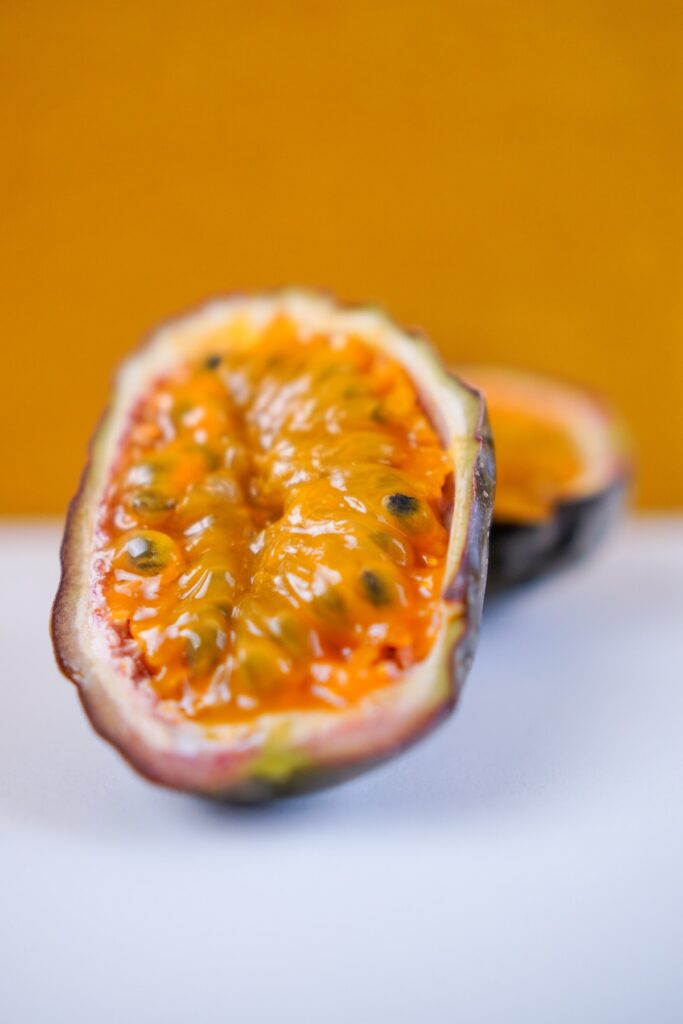
Can dogs eat passion fruit leaves?
Passion fruit leaves are on the vine of the plant. They’re not toxic to dogs, but probably shouldn’t be ingested. There could be dirt or chemicals on the leaves, and, if your dog has a sensitive stomach, eating the leaves might cause vomiting or diarrhea.
Can dogs have passion fruit yogurt?
Is the yogurt store-bought? Then no, your dog should not eat it.
Store-bought passion fruit yogurt usually contains artificial flavors and preservatives, which can be bad for your canine companion. It might even contain artificial sweeteners like xylitol, which can be toxic for dogs.
There’s also a good chance that passion fruit yogurt contains passion fruit seeds, which can be toxic to dogs. Those sugary store-bought yogurts are a less nutritious form of eating passion fruit, with little nutritional value. Stay away from them!
If you really want to feed your dog passion fruit yogurt, the best option is to prepare it yourself. Combine plain yogurt with organic passion fruit, making sure to remove every single seed, for a dog-friendly version. Be sure to give your dog a little bit of yogurt first to see how they handle it, and always feed in moderation.
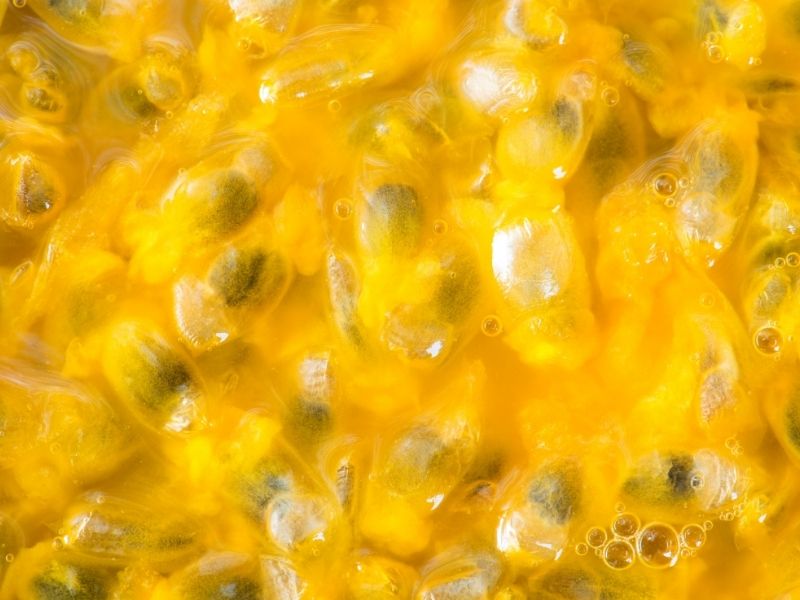
Can dogs eat passion fruit pulp?
Passion fruit pulp refers to everything inside the fruit (liquids, seeds, and all). Since seeds are included, then no, your dog should not eat passion fruit pulp.
Can dogs eat passion flower?
Passion fruit flowers are eye-catching, vibrant, purple flowers that grow on the vine. They’re non-toxic for both humans and dogs, and can even be found in some dog supplements and treats due to their naturally calming properties.
However, I wouldn’t let my dog loose to eat their fill of passion fruit flowers. The flowers may contain chemicals or dirt, depending on where they’ve been grown, and may affect your dog, especially if they have a sensitive stomach.
How to feed your dog passion fruit?
While passion fruit is delicious, it’s not worth the risk of giving your dog a taste. There are toxic components to passion fruit that can be detrimental to your dog’s overall health. It’s best to feed them other fruits that won’t pose any danger, like bananas or blueberries.
However, if you’re dead set on giving your dog a small taste of passion fruit, then do the following:
- Choose a ripe passion fruit and carefully rinse the outside, removing any dirt or debris.
- Scoop out the passion fruit flesh into a bowl, and discard the rind. Be sure to place the leftover peel in a location far from your dog’s reach.
- Carefully remove the seeds and throw them away, again, making sure they’re out of reach from your dog. You can use a strainer or sleeve to remove the seeds, or do it manually. Be meticulous and remove every seed!
- Once you’ve got the passion fruit flesh, free of any rind or seeds, you can give your dog a small taste.
My dog ate passion fruit – what should I do?
If your dog accidentally gets their paws on passion fruit, here’s what you should do.
First, assess how much passion fruit your dog has ingested, and what parts of the fruit. Remember – the rinds and seeds are the most dangerous parts.
If your dog ate a small amount of passion fruit, you may want to consult your vet and monitor your dog for signs of toxicity. These include lethargy, vomiting, and diarrhea.
If your dog ate a whole passion fruit or more, call your vet immediately or take them to the nearest emergency vet.

